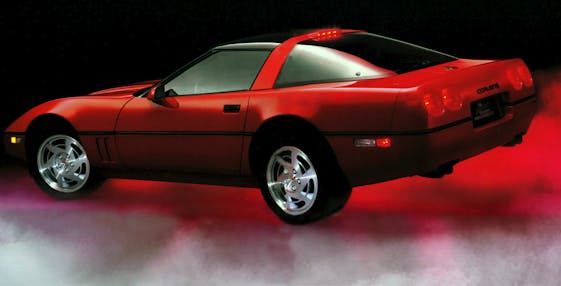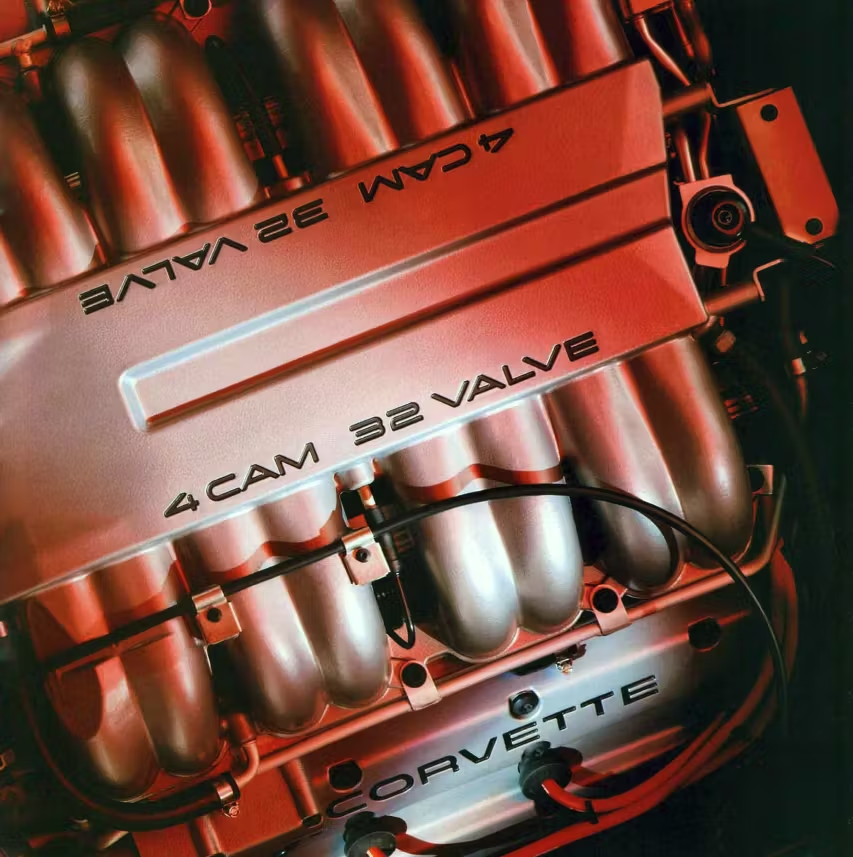Media | Articles
What is the best engine you’ve ever experienced?
This question might sound a little familiar, as we discussed your worst engines in our last installment of According to You. And that’s where Hagerty Community member Bob Keith’scomment comes into play:
“Hey one more thing – excellent piece on the Worst Engines – NOW how about an article on the BEST Engines? I would love to read the final survey results for that!”
Me too, Bob! So let’s do it. Your answers should not be regurgitated opinions from others, nor should they be from content consumed online or in a magazine. Only your experience with an engine can help forge such an enviable accolade.
To kick things off, I’ll share my candidate and give you all a sense of what we’re hoping to see in your answers.
Lotus/Mercury MarineChevrolet LT5 V-8

My experience driving a 1990 Corvette ZR-1 ensured that its 5.7-liter LT5 V-8 motor would become my runaway favorite engine. I got to enjoy it for just a few days as a college student, but that was all I needed. The C5 generation (1997–2004), LS1-equipped Corvette was already a couple of years old by the time I met the C4 generation (1984–96) ZR-1, but I couldn’t care less after tasting the sweet, sweet powerband of that LT5 motor. Between the 370 lb-ft of torque and 375 hp on tap and the wide powerband, the experience absolutely blew me away. (That little key on the dash that turns off half of the sixteen fuel injectors when someone else needs to drive it is worth a chuckle or two, as well.)
Then I drove a Lingenfelter stroker version of the LT5 that was bored out to 6.8 liters and made 668 horsepower—the brain-melting commenced for a second time. The big boy Lingenfelter has all the torque of a big block muscle car with the powerband of a VTEC Honda. You simply cannot understate the magnificence, especially when you open the hood and see Lingenfelter’s signature siamesed intake resting atop those massive double-overhead camshaft heads.
Marketplace
Buy and sell classics with confidence

The ZR-1 was a tour de force when new, but it’s just as impressive nowadays and still shockingly underappreciated in today’s red-hot collector car market. While it’s a bit complex on the induction side of things, the motors are shockingly reliable and quite trustworthy. Why people don’t lust after this vehicle is beyond me, but the LT5 is clearly the best engine I’ve ever experienced.
And with that, I leave it to you, Hagerty Community:
What is the best engine you’ve ever experienced?
Jump in with your experiences in the comments below.
Check out the Hagerty Media homepage so you don’t miss a single story, or better yet, bookmark it.






My ’70 Duster 340 was an awesome, sweet ride! It could beat many GM & Ford 5.7L powered vehicles.
Only problem was the hydraulic valves began to float at about 135mph.
I would say #1 is the 231/3.8/3800 Buick V6
After having owned several examples, they are robust, capable of north of 200K miles, and deliver decent power for a V6
#2 would be the Cadillac 425 (77 – 79) for a lot of the same reasons
toyota 22RE I have had both 4runners and hylux pickups with this engine in and they have NEVER disapointed Me
Hear hear, Joseph! 😍
Two wheels: easy. The 919 4-cyl in my old CB919. Torque like a twin, but better top end. And with the right exhaust, sounded amazing. One of the only bikes I regret selling..
Four wheels: hard to pin that down. The F136Y 4.7 V8 in the Maserati GranTurismo is both sweet to listen to and to drive. The 1.8 BPT in the 1992 Mazda Familia GTX is everything I wish my Miata’s motor was. But I think I have to go with the LF3 TTV6 from the CTS V-Sport. Yeah, it’s not the LT4 V8 and there’s a reason for that. It was as tame as it could be around town, but not so nerfed that you had to prod it to move the car. And when you needed to pass someone, you could either drop a gear (and disappear) or just mash the loud pedal and let the engine do its thing. But what was so great about it is that it fit the demeanor of the car perfectly. For those who haven’t driven one, a CTS V-Sport is about the best sleeper you can buy. It’s subtle. It’s completely missable in a crowd. It doesn’t have garish exhausts or wheel arches or hood bulges, but it out-brakes its German peers, will peg .93g on the skid pad, and hits 60 in less than 5 seconds. The best part is that the combination of the car’s design and abilities and its engine’s design and abilities make you feel like You Know Something No One Else Does. Like you’re pulling one over on pretty much every other car on the road – it’s completely innocuous until you want to get a move on, and then it’s effortless speed. And the fact that you can say that about the car and the engine makes it stand out as something special.
My vote would be for the Buick 3800 Series II. It has needed nothing for 18 years other than oil changes and regular service items. It runs smooth and has nice power off the line. At 70 to 75 mph it returns over 30 mpg. It never skips or misses a beat and it’s not overly complicated. It follows the KISS principle and I think I will probably still be daily driving it 10 years from now.
I am in my 70s and have had many cars and built most of them up for better performance. One of the ones I remember best, was a 69 Roadrunner that originally came with a 383ci engine and A833 4-speedand 3.23:1 rear gear. Of course, that wasn’t good enough. I pulled the engine and rebuilt it with 0.030″ over 12.5:1 forged pistons, polished crank, H beam rods, ported heads, adjustable rockers and HD push rods to accommodate the biggest solid lifter cam Iskenderian could fit into that engine. It was all balanced for high rpm use. I had a tunnel ram with a pair of Holley center squirters on top of it and Hooker SuperComp headers channeling the exhaust out through a set of 3.5 in pipes. I installed a set of 4.56:1 gears in the back and went hunting every Saturday night. That thing was really too radical for everyday use, but I drove it anyway. It wouldn’t hit on all cylinders until it was above 4000 rpm. The cam powerband was listed as 6500 to 8000 rpm, but it sounded so good getting there. It also fouled the plugs in short order driving on the street. I had to carry extra plugs with me in case I actually got an offer to race later. Totally impractical, but totally fun and wonderful to hear going WOT down the strip or an empty rural road. Yes, times were different then.
Chevrole LT1, from 93-97. An outstanding combination of torque and horsepower, light weight (especially with aluminum heads), compact size, outstanding durability. I ran one for 350,000 miles in an Impala SS, then put it in my roadster and ran it some more.
All of the older small block Chevy engines I owned have good to me. Current 48 year old one with 90,000 original miles runs great, but will need new valve seals sometime.
I drove a few Hellcat powered vehicles in my time at a dealership, but I have to say the naturally aspirated 6.1L and 6.4L hemis are probably the best engines I’ve experienced so far. Especially with a Tremec 6060 behind them! Responsive, smooth, and unrelenting torque.
The GM 5.7 “Vortec” engine is really good. Have a close friend with over 300,000 on his 5.7 equipped truck and I’ve had two GMT400 trucks with it that I sold with 250,000 miles on the clock and I still see one of those trucks driving around town today. Only real flaws I’ve experienced is that the intake gaskets leak coolant eventually, but the upgraded ones the aftermarket sells permanently fixes that and the funky distributor cap is corrosion prone, so buying the expensive OEM grade caps upon replacement are an absolute must. They might be low on power by today’s truck standards, but unless you actively try to kill one, they just last.
My vote goes to the Ford Coyote V-8 in my Mustang. Smooth, linear power from idle to redline. If it were in an Aston Martin, no one would have an issue.
Had three Taurus SHO manuals, 90, 93 and 95. Loved the Yamaha engine–and the castings are beautiful. I was in the aluminum casting business then. MN State Patrol let me out of a 105 in a 55 in NW MN in my ’93. I was just at Arctic Cat engineering and I was let off in exchange for a bit of info about their new engine…then the following winter the same patrolman saw me in the local restaurant. “Are you being a good boy?” he asked lol
I drove all of those SHO’s 50K a year with no problems. Then they ruined the SHO. If there are any decent ones left would love to have one..in red again of course.
There are a number of good engines I have enjoyed. Any of the new LS and LT engines for one. They are build to last and you can make a ton of power easy.
For Vintage the old 428 HO Pontiac was a jewel. With only a cam and some tuning it could really be opened up.
One of the best I have driven daily was the 2.0 Ecotec LNF Turbo. I tuned it and drove it daily for 10 years putting out 23 pounds of boost and 300 HP and 315 of Torque. It was limited due to the transaxle.
Now the best engine I ever got to use or control was an airplane engine. I got to fly a B 25 Bomber with Two 1,700-hp Wright Cyclone supercharged 14-cylinder radial engines. The sound and the roar of these two engines was amazing. Think of it like having 14 open pipe Harley Davidson beside you at for throttle.
The Throttle up before take off to clear the engines you can just feel the force on the brakes holding the plane back. Even with head phones on my ears rang for two days.
Note too my 2.8 HO in my Fiero. While it is nothing radical. It has been fully reliable and moves the car along well but sounds like an exotic engine. Many question if it is a V8. Pontiac did well on the exhaust on that one.
The 2.8 Fieros are great, as are the 2.5 Iron Duke cars, despite what the internet would have you believe. Both tremendously reliable engines, wrapped in a vastly underrated, and fun, package.
1. GM Buick 3.8. Absolutely the best. Reliable, relatively simple to work on, and intelligently designed.
2. GM 2.8/3.1/3.4. Also a brilliant design. These things run forever, and are reasonable easy to work on.
3. GM 2.5 Iron Duke. Cannot believe this was on your “worst engine” list. They’re intelligently designed, easy to work on, and they run forever. They’ve literally been running for 40 years non stop in the postal trucks. (Absolutely guarantee that their new electric vehicle won’t last that long.)
This is coming from someone who’s had experience working on countless cars with these engines, not just based on a single experience. I’d also add that the GM 5.7 was pretty darn good too, albeit with some slight quirks.